Filteredwaterguide.com is supported by readers. If you purchase through referral links on our site, we make a commission at no extra cost to you. Learn more.
Water is a fundamental necessity for all living beings. However, the quality of water we consume or use for various purposes can significantly impact our health and the longevity of our appliances.
This is particularly true for city water, which often contains a high level of minerals such as calcium and magnesium, making it “hard.”
The solution? Water softeners.
In this article, we will delve into the best water softener, providing you with a comprehensive review and a guide to making the best choice for your home.
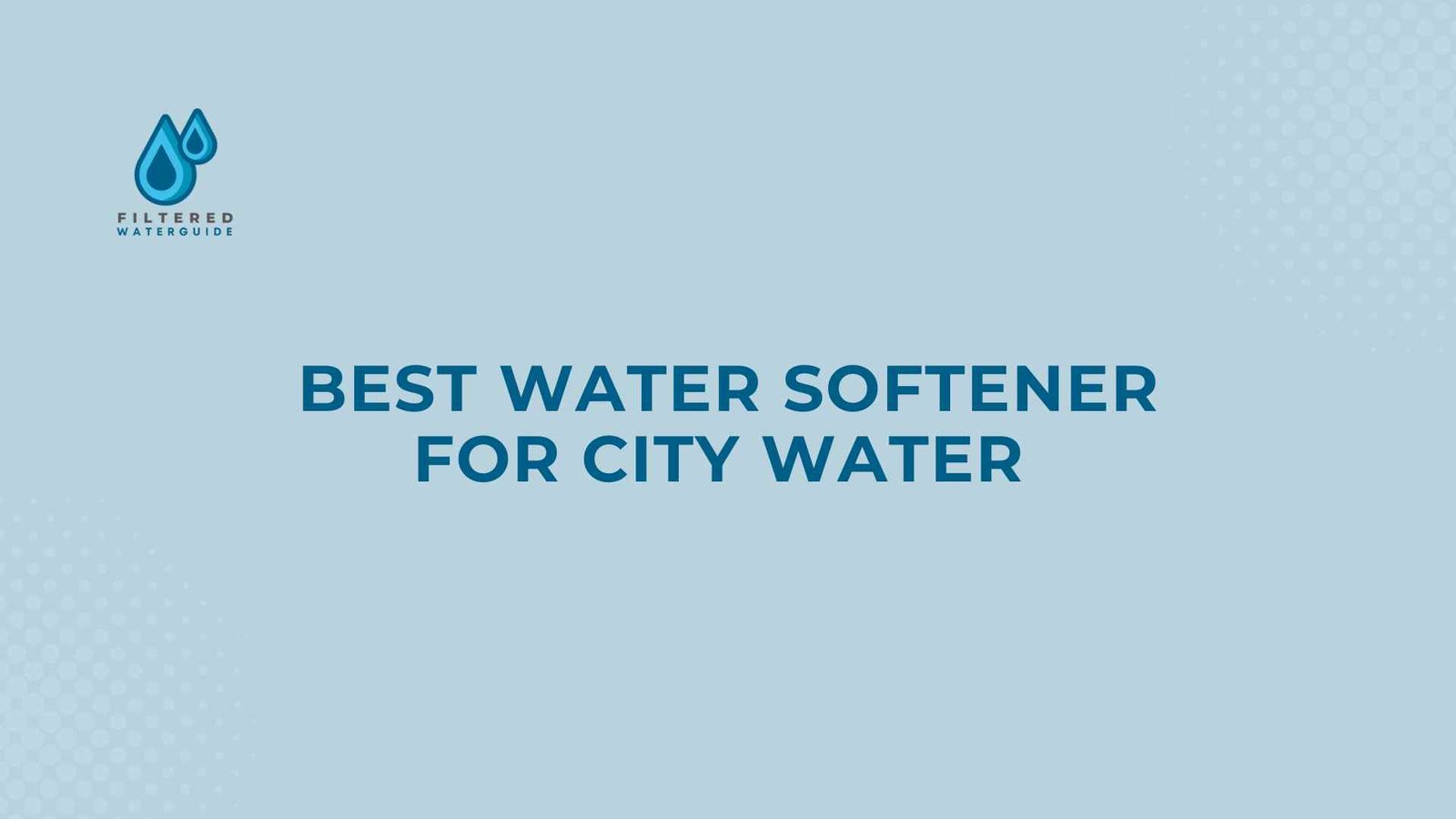
Before we delve into the specifics of each water softener system, it’s important to understand the key factors that should influence your decision.
Here’s a quick overview of the key factors you should keep in mind. We’ll get into more detail on each of these later in the article.
As you can see, choosing the best water softeners for water involves more than just picking the first or cheapest option you come across. It requires careful consideration of your specific needs and circumstances.
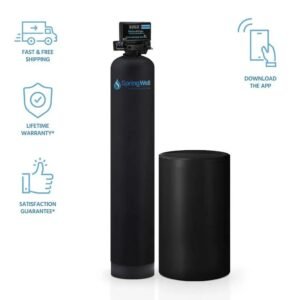
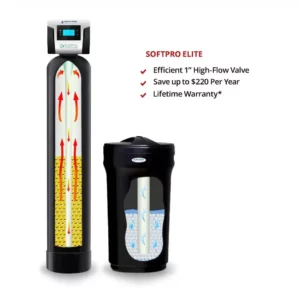
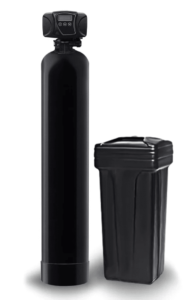
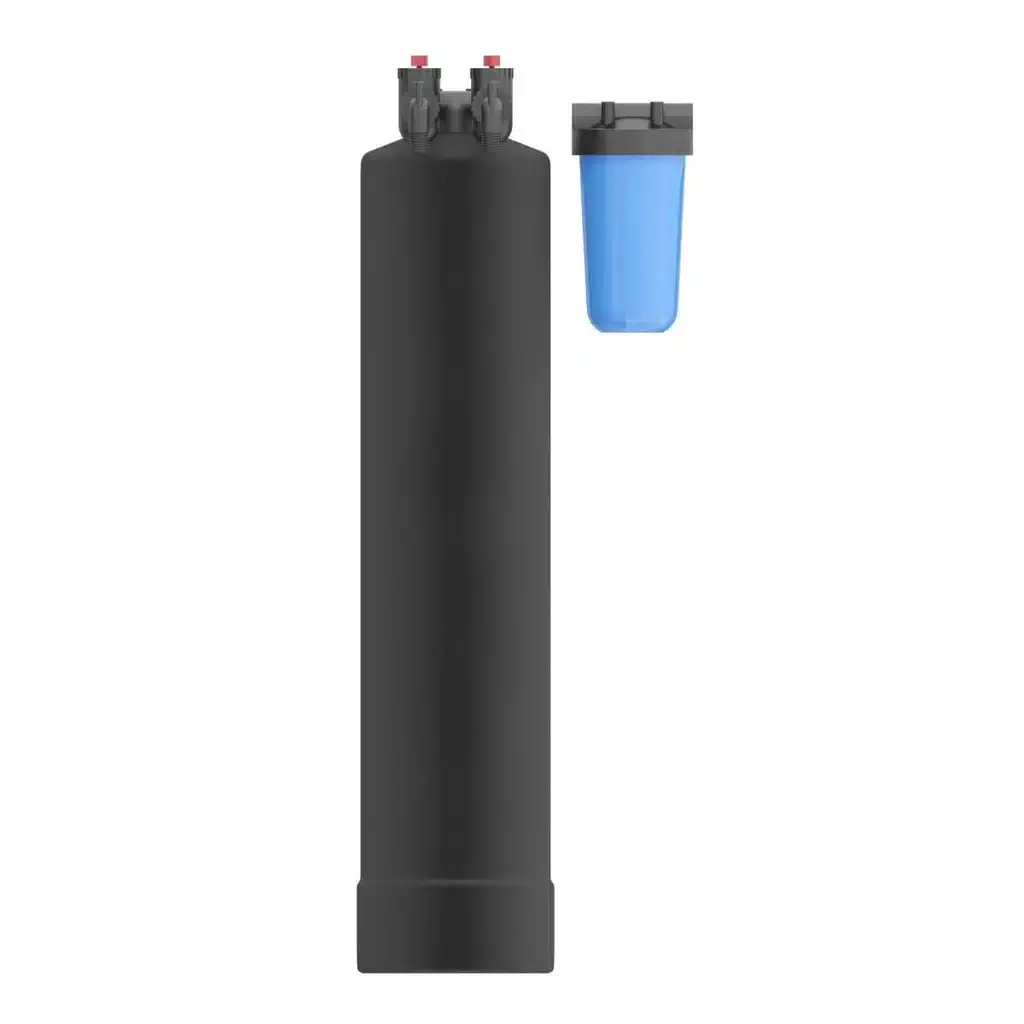
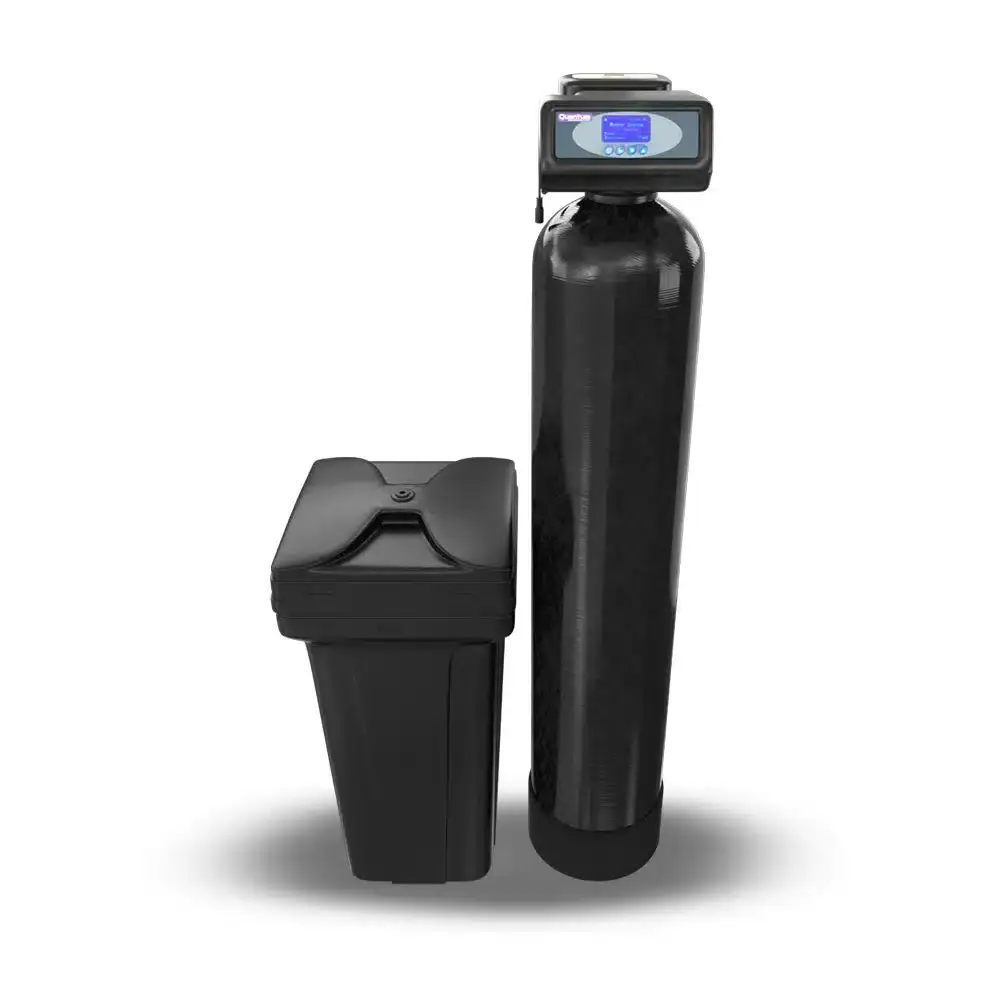
Choosing the right water softener for your drinking water can be a daunting task given the numerous options available in the market.
To make your decision easier, we have researched and reviewed some of the best water softening systems specifically designed for drinking water from the city. These reviews are based on their efficiency, grain capacity, flow rate, ease of installation, and customer reviews.
Let’s dive in and explore these top picks for public water.

In our extensive experience with water softener systems, we’ve found the SpringWell Salt Based Water Softener System to be the best overall choice for water softener. This system is designed to provide a comprehensive solution to hard water problems, offering a range of features that make it stand out.
The SpringWell system uses a high-capacity resin for ion exchange, effectively removing hardness minerals from your drinking water. This is a crucial feature as it directly impacts the softening performance of the system. In our testing, we found that this high-capacity resin consistently delivered soft water, significantly reducing scale buildup in appliances and improving the feel of the water on skin and hair.
The digital control head with a unique touchpad is another feature that impressed us. It allows for easy control and monitoring of the system, making it user-friendly even for those who are not particularly tech-savvy. The system’s regeneration process is demand-initiated, meaning it only regenerates when necessary, saving both water and salt. This feature not only enhances the efficiency of the system but also contributes to its eco-friendliness.
One of the standout features of the SpringWell system, in our view, is its Bluetooth Head Controller. This feature brings a level of convenience that is not commonly found in other water softeners. It allows you to control and monitor your water softener from your smartphone, making it incredibly convenient to use. The system also comes with a 6-month satisfaction guarantee and a lifetime warranty on all parts, giving you peace of mind with your purchase.
Check out Out full review of the Springwell Salt Based Softener

As our Editor’s Choice, we highly recommend the SoftPro® Elite High-Efficiency City Water Softeners. This system stands out for its efficiency and performance. It comes in two different options: a well water softener and a water softener, both designed to offer the most efficient performance, helping you to save money and salt while achieving the same soft water benefits.
In our experience, the SoftPro Elite’s features, such as the soft water brine tank, mineral tank, LCD touchscreen meter, fine mesh resin, and protective neoprene jacket, significantly enhance its performance and user experience. The system also includes a bypass valve for easy maintenance, which we found to be a convenient feature, especially for those who prefer a hands-off approach to their water softener system.
One of the standout features of the SoftPro Elite is its Smart Precision+ Brining. This feature helps to conserve salt usage by up to 30 percent. The intelligent system calculates precisely how much brine is needed based on the resin content, ensuring reduced waste from regeneration. In our testing, we found this feature to be highly effective, resulting in noticeable savings in salt usage over time.
The SoftPro Elite also comes with all the parts needed for installation. While some users may require professional installation, we found the included instructions to be clear and straightforward, making it possible for DIY enthusiasts to install the system themselves.

The Fleck 5600SXT Water Softener System is our runner up choice. This whole home digital water softener comes loaded with resin for an easier initial installation. The system uses smart technology to regenerate based on water use, helping you to save water in the long run and providing a more efficient performance.
In our testing, we found that the Fleck 5600SXT offers a good balance of performance and value. It uses an upgraded paddle wheel meter for a more efficient performance. With a 48,000 grain capacity, it could easily produce the water required for a standard family household without persistent regeneration.
One of the things we appreciate about the Fleck 5600SXT is its user-friendly design. The system comes with a digital metered control head that allows you to easily monitor and adjust the system’s settings. This feature, combined with the system’s smart regeneration based on water usage, ensures that the system operates efficiently, saving you water and salt.
Another notable feature of the Fleck 5600SXT is its durability. The system comes with a durable polyglass tank and a brine tank with a safety float, ensuring that it can withstand long-term use. It also comes with a lifetime warranty on the resin tank, giving you peace of mind with your purchase.
Read more: Fleck Water Softener Review – 5600SXT
Overall Rating – 4.3
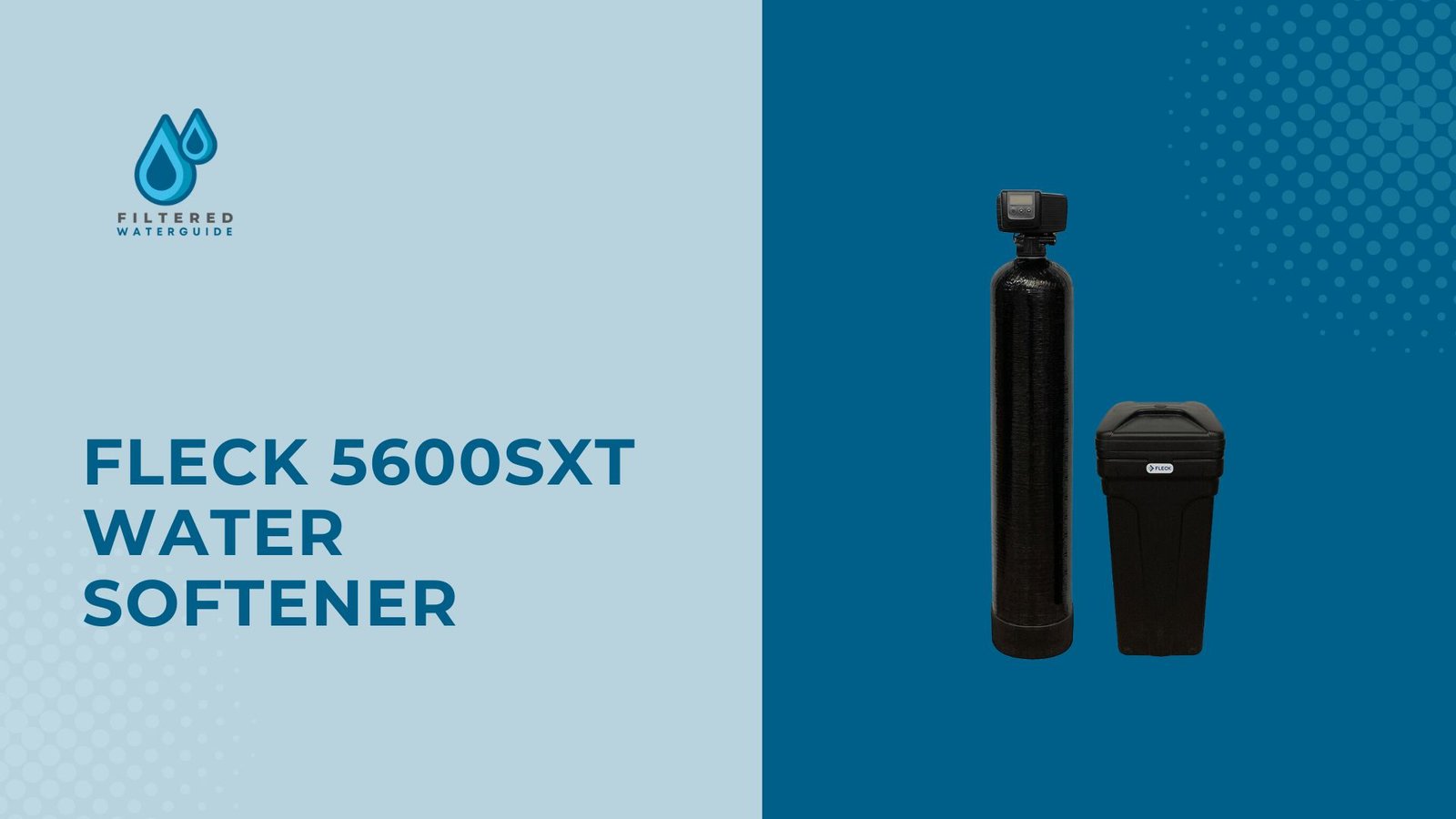

For those looking for a salt-free option, we find the SoftPro Elite Salt-Free Water Softener to be one of the best choices on the market. This water softener is known for its high efficiency, user-friendly design, and excellent performance.
The SoftPro Elite is designed to be super efficient, with no back flushing and no wastewater. All the water it processes goes directly back into your home, making it an environmentally friendly option. It’s also equipped with a programmable control head with an LCD screen, making it easy to use and customize according to your needs.
One of the standout features of the SoftPro Elite is its use of ‘upflow technology’. This means the water flows up through the main resin tank, making the resin beads work more efficiently and helping to keep them cleaner. This results in significant water and salt savings, making it a cost-effective choice.
The SoftPro Elite also offers excellent company support, with customers often commenting on the reputation for providing outstanding customer service. It comes with a 6-month money-back guarantee and a lifetime warranty, giving you peace of mind with your purchase.
However, while the SoftPro Elite offers many benefits, it’s worth noting that it may require professional installation due to its complex setup. It’s also relatively expensive upfront, but the long-term savings and benefits can make it a worthwhile investment.

In our experience, the Quantum Water Softener AR2 stands out as an excellent choice for large homes. This water softener is known for its high efficiency and innovative design, which makes it a great fit for households with high water consumption.
The Quantum AR2 employs a unique upflow regeneration efficiency that drives hardness minerals up through the resin media. This double action not only effectively softens your water but also saves on salt usage, making it a cost-effective solution for large homes.
Moreover, the Quantum AR2 has a unique design that uses a ceramic disk component rather than pistons, seals, and spacers. This design not only enhances its efficiency but also reduces the need for frequent maintenance, saving you time and effort in the long run.
The Quantum AR2 is also praised for its high capacity, with up to 64,000 Grain Capacity. This means it can handle a large volume of water, making it ideal for large homes or households with high water usage.
However, it’s important to note that while the Quantum AR2 is highly efficient and effective, it may require professional installation due to its complex setup. But once installed, it promises to a delivery boasting excellent performance and significant improvements in your water quality.
The need for a water softener largely depends on the hardness of your water. Hard water contains high levels of minerals like calcium and magnesium, which can cause a variety of issues in your house, from scale buildup in your pipes and appliances to dry skin and hair.
In this section, we’ll guide you through some key considerations to help you determine whether you need a water softener for your water.
The hardness of water can vary greatly depending on the source of the water and the treatment processes it undergoes. Some cities have naturally soft water, while others have hard water due to high levels of minerals like calcium and magnesium.
Hard water can cause a variety of issues in your home. It can lead to scale buildup in your pipes and appliances, which can reduce their efficiency and lifespan. It can also cause dry skin and hair and make it harder for soap to lather, leading to higher soap usage and potentially higher costs.
To determine if your city has hard water, you can check the water quality report provided by your local water utility. This report should provide information on the hardness of your water. Alternatively, you can use a water hardness test kit, which can be purchased online or at a local home improvement store.
The source of your city’s water can also impact its hardness. Water can be sourced from various places, including rivers, lakes, reservoirs, and underground wells. Generally, water sourced from underground wells tends to be harder as it has more contact with minerals in the earth. On the other hand, surface water from rivers and lakes tends to be softer.
However, the treatment processes your city uses can also affect the hardness of the water. Some cities use water softening processes to reduce the hardness of the water before it is distributed to homes. Therefore, even if your city sources its water from a hard water source with various contaminants, it may still be relatively soft by the time it reaches your home
One of the most visible signs of hard water is scaling on appliances. Scale residue is a hard, chalky deposit that forms when hard water is heated or left to evaporate. It can build up on your appliances, such as your kettle, coffee maker, dishwasher, and washing machine, causing stains and reducing their efficiency and lifespan.
If you’re noticing scaling on your appliances, this is a strong indication that you have hard water. In this case, a water softener can be a valuable investment. It can help to prevent scale buildup, prolonging the lifespan of your appliances and saving you money in the long run.
When it comes to choosing a water softener for water, one of the key decisions you’ll need to make is whether to go for a salt-based or salt-free system. Both products have their advantages and disadvantages, and the best choice for you will depend on your specific needs and circumstances.
In this section, we’ll explore the differences between salt-based and salt-free water softeners to help you make an informed decision.
Salt-based water softeners work by using a process called ion exchange to remove the minerals that cause water hardness. They replace these minerals with sodium ions, effectively “softening” the water. This process is highly effective at reducing water hardness and can help to prevent scale buildup in your pipes and appliances.
However, salt-based products do have some drawbacks. They require a regular supply of salt, which can add to the ongoing costs of the system. They also produce wastewater during the regeneration cycle, which can be an environmental concern. Furthermore, the sodium added to the water by these systems can be an issue for people on low-sodium diets.
Salt-free water softeners, on the other hand, do not remove hardness minerals from the water. Instead, they work by changing the structure of these minerals so that they do not form scale. This can help to reduce scale buildup in your pipes and appliances, although it may not be as effective as a salt-based system.
The main advantage of salt-free systems is that they do not require a regular supply of salt, making them easier and cheaper to maintain. They also do not produce wastewater, making them a more environmentally friendly option.
However, because they do not actually remove hardness minerals from the water, they may not be the best choice if you have very hard water or if you are sensitive to these minerals.
The best choice between a salt-based and salt-free water softener for water will depend on a variety of factors, including the hardness of your water, your budget, your environmental concerns, and your health needs. If your water is very hard, a salt-based system may be the most effective option.
However, if you are concerned about the environmental impact or the ongoing costs of a salt-based system, a salt-free system may be a better choice. As always, it’s important to do your research and consider your specific needs before making a decision.
Here is a great video from the folks over at US Water Systems explaining the difference in more detail.
When it comes to ensuring the quality of your drinking water, choosing the right water softener system is crucial. Below, we delve deeper into the key factors you should consider when making your decision.
When it comes to ensuring the quality of your drinking water, choosing the right water softener system is crucial. Below, we delve deeper into the key factors you should consider when making your decision.
Water hardness refers to the concentration of certain minerals, primarily calcium and magnesium, in your water supply. These minerals are dissolved as water passes through the ground and rocks, resulting in varying degrees of hardness depending on the source of your water.
When water hardness is high, it can lead to issues such as scale buildup in pipes and appliances, dull laundry, dry skin and hair, and poor soap and detergent performance. It’s critical to determine your water’s hardness level to choose a suitable water softener system.
You can find your water hardness by referring to a water quality report from local utility companies, or you can use a water hardness test kit for a more hands-on approach. Test kits usually involve adding a reagent to a sample of your water and observing the color change to estimate hardness levels.
Knowing your water hardness level will inform the type and size of water softener you need. If you have extremely hard water, you may need a larger or more powerful system, while if your water is only slightly hard, a less powerful system could suffice.
The size of your home and the number of people living in it can significantly impact the type and size of water softener you need. The more water your household uses, the larger and more robust the system needs to be.
For larger homes or homes with a high number of occupants, a higher-capacity water softener will be required to handle the increased water demand. It’s also important to consider the specific water usage in your home. If you frequently use large amounts of water – for gardening, swimming pools, or extensive laundry needs – you may need a larger water softener despite the actual size of your home or the number of occupants.
The size of your home can also impact the installation process for a water softener. Larger homes may require more complex installation processes or even multiple systems, while smaller homes might offer a fewer step installation process due to space limitations.
There are different types of water softeners, including salt-based, salt-free, and hybrid softeners. Each has its pros and cons.
A salt-based softener uses a process called ion exchange to remove the minerals that cause water hardness. They are very effective but require a regular supply of salt and produce wastewater.
Salt-free softeners, on the other hand, do not remove hardness minerals but instead change their structure to prevent them from forming scale. They are easier to maintain and more environmentally friendly than salt-based softeners, but they may not be as effective, especially if your water is very hard.
A hybrid softener combines the features of salt-based and salt-free softeners and can be a good option if you want the benefits of both.
Proper installation and maintenance of a water softening system are crucial for its longevity and effectiveness. Depending on the complexity of the system, you may be able to install it yourself, or you may need professional assistance. Keep in mind that incorrect installation can lead to poor system performance or even damage.
Maintenance is just as important as installation. Depending on the type of system you have, maintenance may involve regularly adding salt to the system, periodically cleaning the system, or replacing filters. Some systems may also need occasional professional service for tasks such as checking settings or troubleshooting problems.
If you’re not comfortable with or able to perform these tasks yourself, you might need to consider the costs of professional installation and maintenance services when choosing your system.
Your budget will be a determining factor when choosing a water softener system. The cost of these systems can vary significantly, from a few hundred to several thousand dollars. When deciding on a budget, you should consider both the upfront cost of the system and the ongoing costs.
The upfront cost includes the purchase price of the system and installation costs. But remember, the expense doesn’t stop there. Ongoing costs can include salt or other regenerants (for salt-based systems), replacement filters, electricity (for electric models), and any necessary professional maintenance or service.
Also, it’s worth considering the potential cost savings a water softener can bring. By preventing scale buildup with a descaler system, a water softener can extend the lifespan of your appliances and reduce energy usage, which could result in lower utility bills.
By taking these factors into account, you can make an informed decision that fits within your budget without compromising on water quality.
The water softener system is connected to your home’s plumbing, so the quality and condition of your pipes play a crucial role in the system’s overall performance. Here’s what you need to know about pipes and their relationship to water softener systems.
The material of the pipes can impact how your water softener system functions. For example, a copper pipe is often used in older homes and is susceptible to corrosion over time, especially when exposed to hard water. This could potentially impact the effectiveness of your water softener system.
On the other hand, plastic pipes (like PVC) are resistant to corrosion, but they may not handle high temperatures well.
The size and layout of your plumbing system can also impact the performance of your water softener system. For instance, if you have a large home with a complex plumbing system, you may need a larger water softener system or multiple systems to effectively treat all of your water.
Moreover, the location of the system in relation to your plumbing can affect the quality of your water. Ideally, a water softener should be installed close to where the water enters your home to ensure all water is treated.
Even the best water softener system can’t do its job properly if your pipes are in poor condition. Regular maintenance of your pipes can ensure that your water softener system functions effectively and can extend its lifespan. This maintenance might involve regular inspections for leaks and damage, cleaning to remove any scale buildup, and, in some cases, replacement of old or damaged pipes.
Finally, it’s crucial to ensure your pipes are compatible with the water softener you choose. Some systems, especially those using salt, may be corrosive over time to certain types of pipes. Therefore, it’s important to consider the compatibility of your pipes with the type of water softener you choose. If you’re unsure, it’s always best to consult with a professional.
Understanding the relationship between your pipes and your water softener system is crucial for ensuring the longevity of both. By selecting a compatible water softener system and ensuring regular maintenance of your pipes, you can improve the quality of your water and the lifespan of your plumbing system.
Filter types play an integral role in water softener systems, dictating the system’s efficiency and effectiveness in removing hardness minerals from the water. Choosing the correct filter can make a significant difference in the quality of your water and the lifespan of your system. Here are some common filter types found in water softener systems.
Resin filters are the most commonly used filters in salt-based water softeners. They work by exchanging the hardness minerals in the water (calcium and magnesium) with sodium or potassium ions. Resin filters are very effective at softening hard water but need to be regenerated regularly using a brine solution.
These filters can last for many years if maintained correctly, but their lifespan can be reduced if exposed to chlorine frequently. Some systems water include a pre-filter to remove chlorine and extend the life of the resin filter.
TAC filters are used in salt-free water softeners. They work by altering the structure of the hardness minerals, changing them from a form that can form scale to a form that can’t.
These filters do not require regeneration, making them easier to maintain than resin filters. However, they may not be as effective at softening very hard water.
Some water softener systems use a dual-tank setup, with one tank containing the resin or TAC filter and the other containing a brine solution for regeneration (in the case of resin filters) or a second filter for additional water treatment.
These systems can be more efficient, as one tank can be in use while the other is regenerating or providing additional filtration. However, they are also larger and more exp ensive than single-tank systems.
While not directly involved in the water softener process, carbon filters are often included in water softener systems as a pre- or post-filter. Carbon filters are excellent at removing chlorine, volatile organic compounds (VOCs), and other impurities from the water.
This not only improves the taste and odor of the water but can also protect the main filter (resin or TAC) from these impurities, extending its lifespan.
Choosing the right filter for your water softener system will depend on your specific needs, including the hardness of your water, the presence of other impurities, your budget, and how much maintenance you’re willing to do.
Choosing the best of the water softeners for city water can significantly improve your water quality, protect your appliances, and enhance your overall health. While there are many great options on the market, our top pick is the SpringWell Salt Based Water Softener System for its high efficiency, excellent grain capacity, and innovative features.
However, the best choice for you will depend on your specific needs and circumstances. Always consider factors such as water hardness, home size, type of softener, installation and maintenance requirements, and budget when making your decision.
© 2024 Filtered Water Guide. All rights reserved.